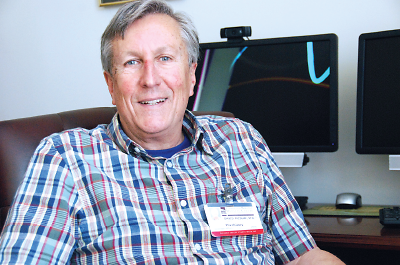Professional athletes are different from most people in some ways. While they have superb physical skills and way more money, they can have the same problems coping with their work or personal lives as anyone else, which is why many pro teams, as well as colleges and even high schools, have mental health professionals on call.
It would be an oversimplification to call McDuff a “sports psychiatrist.” His business card reads “Behavioral Sports Medicine,” and he prefers to call himself a “sports performance physician.”
Sports psychiatry is not just about treating athletes with a mental illness, said Todd Stull, M.D., president of the International Society of Sports Psychiatry and the sports and performance psychiatrist at the University of Nebraska, Lincoln, athletic department. “We also work on mental skills training to help players develop perseverance and routines, improve their concentration and composure, and build their confidence.”
After medical school at the University of South Alabama in Mobile, McDuff served as a psychiatrist in the Army and then the Reserve, an experience with action-oriented young people that has served him well in sports.
“In the Army, you get to go places and do things in your training that are not typical in a civilian residency,” said McDuff in an extended interview in his office at the University of Maryland in Baltimore. “You go on deployments, you go to the field, you go into a military unit and you see where they train, and you learn how to engage them.”
That’s what he does in sports, he said.
“I walk among the players in practice or in the training room,” he said. “I initiate a conversation that builds a relationship that at some point could lead to them ask me a question or come in to see me.”
Over the years and across 35 sports by his estimation, McDuff has helped athletes deal with sleep and energy problems, stress recognition and control, substance use, injury recovery, and team conflicts.
A board-certified addiction specialist, McDuff was originally hired at Maryland after his Army service as the founding director of the Division of Alcohol and Drug Abuse. A year or so later, he helped set up an employee assistance program for hospital employees and their families.
That model again drew on his military experience: visiting work units, giving talks, answering questions, and building relationships before some concern became serious.
“That’s how we got to work with the Orioles,” he recalled. “They had an open bid for an employee assistance program, which was required by Major League Baseball.”
Their experience—not to mention a location three blocks from the Camden Yards stadium—got the University of Maryland group the contract.
The Major League Baseball's requirements for employee assistance programs don’t specify how involved its personnel should get with the team. Some providers just hand out brochures and business cards. Others give talks to the players in preseason training and through the regular season, which likely increases utilization.
“I’d say there are two or three teams in baseball and two or three in professional football that have psychiatrists who go to the facility,” he said. He estimates that perhaps 30 National Football League teams have a master’s or doctoral-level psychologist who goes on site two or three days a week.
McDuff chooses to be available to players where they practice and compete. By being available on-site, he said that the annual service utilization rate rises from the 5 percent typical of employee assistance programs to 50 to 60 percent for professional and 30 to 40 percent for college athletes.
Players determine the levels of privacy and confidentiality they need. If they choose, McDuff talks with them in the training room with other players nearby, goes into a team physician’s office, or meets offsite at his own office. The interactions are often spontaneous.
“The other day I went to a facility and an athlete said: ‘I need to talk to you,’ ” he recalled.
“I said, ‘OK, let’s talk.’ And in the trainers’ office he said, ‘I get upset when I fly, especially when there’s turbulence.’ So we had a conversation about what you can do about that. But if he had not seen me before, he would not have contacted me.”
All teams have electronic medical records so when McDuff prescribes a medication, a note with the reason for the prescription is entered so that the team physicians know what the player is taking.
“But I keep a separate chart for continuity of care when they disappear in the off-season,” he said. “I continue to interact with them by email or text to bridge that gap and re-engage with them when they come back.”
If a player goes to another team, McDuff makes sure that he is linked to a clinician in his new city.
He works closely with the other members of the medical staff when a player is recovering from an injury. (In addition to McDuff, the Orioles also employ a team physician/medical director, an orthopedist, a dentist, an optometrist, and athletic trainers.)
“If there are some emotional or behavioral barriers to injury recovery, especially if there is some setback, we’ll all work together to overcome those barriers,” he said. “Every injured player gets seen by someone on the medical staff to explain the injury and its treatment and then monitors his response during recovery.”
Trainers, who probably see players more often than anyone, play a big role in connecting athletes with specialists like McDuff. “The trainer for the Baltimore Ravens will ask players, ‘What’s going on in your life that’s getting in the way of your performance?’ ”
Working as a sports performance physician also means putting integrated medicine into practice.
“I think of myself as a psychiatrist who likes to work at the interface of psychiatry and the rest of medicine,” he said. “If I go into a training room and within three minutes I’ve interacted with an orthopedic surgeon, a neurosurgeon, a primary care sports medicine physician, and athletic trainer, and a sports chiropractor, and I’m adding in some emotional and behavioral components—that’s integrated medicine.”
After he gave a talk at the APA Annual Meeting in Atlanta this past May, young psychiatrists lined up to talk to McDuff, mostly about how to get into this professional niche.
“In the past five years it’s become an area of strong interest within psychiatry,” he said. The birth of the International Society for Sports Psychiatry is an illustration and it is no surprise that doctors are interested in sports.
“Perhaps 60 to 70 percent of students who go to medical school played sports in high school,” he estimated. “And younger providers are really interested in roles where they’re challenged to think quickly, on their feet, and have a skill set that’s relevant to other providers. That’s exciting.”
His advice about where to begin is simple: Go find a team and volunteer. Give a talk on something that will be relevant for the athletes’ performance.
“Go to games and see if the teams can implement some of those suggestions,” he said. “And then people will come up to you and talk about other potential barriers to performance.” ■

